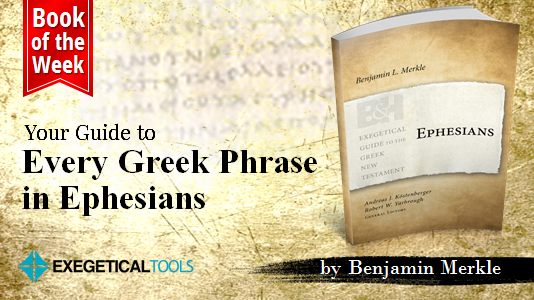Ephesians is not easy Greek. The sentences are complex and flowing; the syntax is ambiguous; genitives abound and interpretive decisions never cease.
The Exegetical Guide to the Greek New Testament series from B&H Academic has so far produced many volumes, such as John, Philippians, and others. This latest volume covers every phrase in Ephesians with acute exegetical skill as well as concision.
One of the best features of this volume is how brief it is. It spans only 246 pages, which is impressive given the length of Ephesians at six chapters. But don’t mistake Merkle’s concision for lack of research; he covers all that he needs to, but omits the fluffy content and language. This type of concision is a service to the reader, especially the busy pastor who needs to get to the point quickly while researching his passage for Sunday morning.
If you haven’t seen this series before, here are some examples demonstrating how useful the series is, and this volume on Ephesians in particular:
- “In love” in 1:4 may modify the preceding “holy and blameless before him” or the following “having predestined us.” Merkle gives these two options, provides five arguments in favor of the first and two arguments in favor of the second, and places an asterisk (*) next to the second option to signify that he believes it is the most likely.
- Adverbial participles in Ephesians are notoriously difficult to interpret since they can carry many possible meanings in various contexts. The participle προορίσας in 1:5 is one example: how is it logically connected to “he chose us” in v. 4? Merkle lists the five options (temporal, means, causal, goal, elaboration) and chooses none, saying they are difficult to adjudicate between. One can appreciate Merkle’s honesty with such a difficult choice.
- In 3:5, Paul says the mystery of Christ was not made known in other generations to the sons of men as (ὡς) it has now been revealed to his holy apostles and prophets. Merkle correctly notes that ἑτέραις γενεαῖς is a temporal dative (with “to the sons of men” as the indirect object) and that ὡς can be either comparing degree (the mystery was revealed to lesser degree in the OT) or kind (the mystery was not revealed at all in the OT).
- In 5:32, Paul says “this mystery is great, but I am speaking regarding Christ and the church.” What is the mystery? There are three options: the one-flesh relationship cited in Gen 2:24; the Christ-church relationship; the Christ-church relationship as a type of marriage. Merkle gives arguments for each view and cites commentators who hold to them. Pastors would do well to spot-check verses they use in counseling, preaching, or teaching using the EGGNT as a guide to ensure their understanding of the verse is correct and based on a proper rendering of the Greek. In this case, a pastor would benefit in marriage counseling from understanding the various ways “this mystery is great” could be interpreted.
These sorts of interpretive issues could be found in commentaries, but only buried beneath all the extra historical and theological analysis (and not all commentaries do well with Greek, either). Merkle’s work gets directly to the issues in the Greek text and makes sure you are aware of all the options before settling on one (possibly wrong) meaning.
I could not recommend highly enough you that acquire every EGGNT volume available, including Merkle’s on Ephesians.
Buy it here on Amazon.


